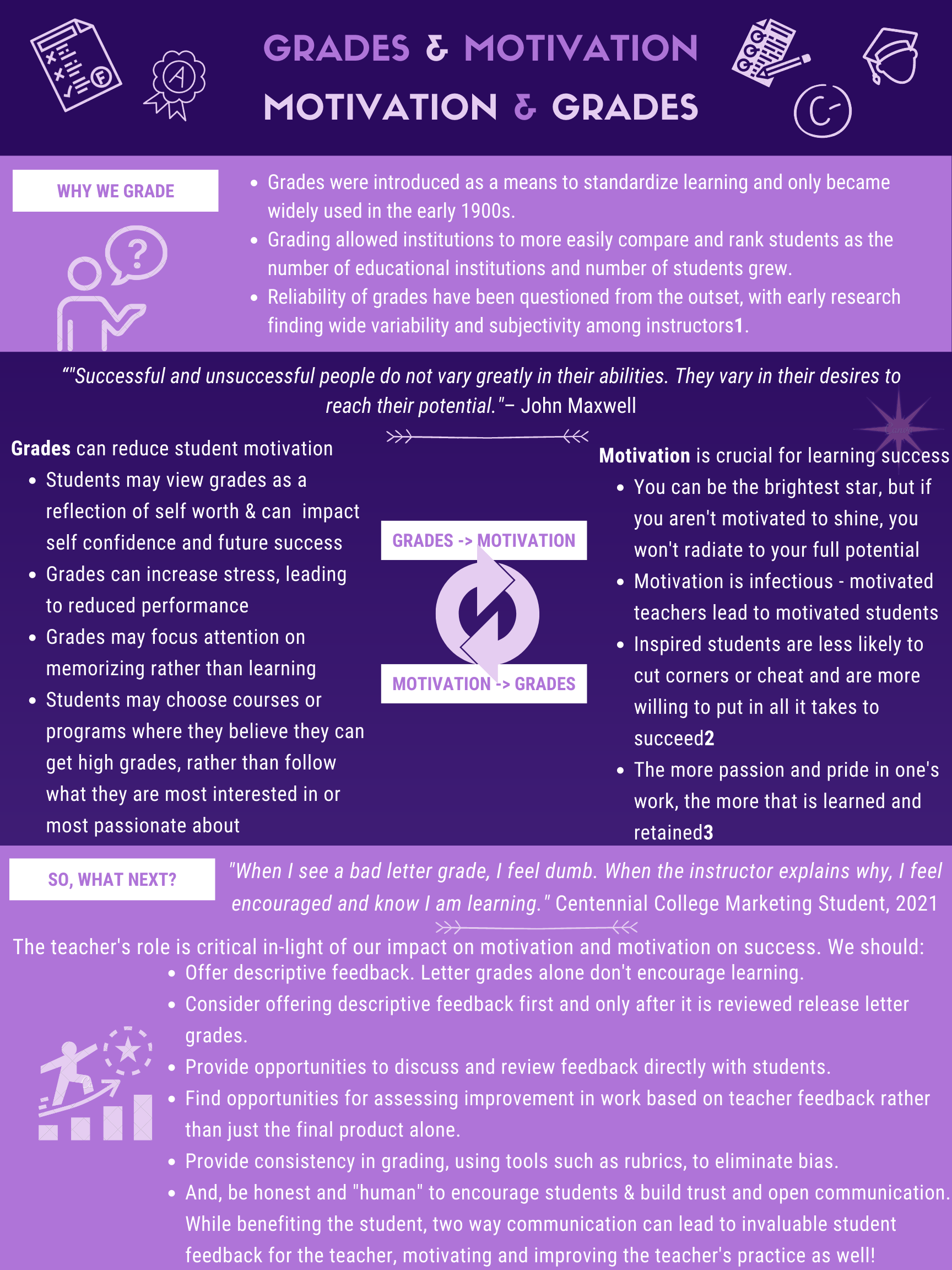6 Motivation and Grades
Michelle Belchetz
MARCH 2021
After reading several articles on “ungrading” I was intrigued and set out to better understand this topic. I felt it was somewhat unrealistic to remove grades completely and wanted to understand the research further. Around the same time, I had a discussion with a group of students, curious to hear their thoughts on grades and the influence grading had on their learning. That was when I decided to shift my direction and focus on exploring the relationship between grades, motivation and learning.
In my conversations with students I have heard the strong desire for teachers to provide more clarity on how their grades were determined. What was good about the submission? What was not so good? And how can the work be improved? In the absence of robust feedback, students seemed to shift their focus to worry – caring more about what they can do to get a good grade on an assessment rather than the desire to truly learn, understand the content and effectively demonstrate their knowledge. In these situations, students seem more concerned about “how to play the game right” to get the grades, rather than focusing on the actual learning experience.
I don’t believe grading is going away any time soon and I am OK with that. If we get it right, we can remove a lot of the stress, inaccuracies, pitfalls and potential long-term impacts grading can have on students. By adopting better ways to evaluate and grade, students can be motivated to learn and continue to be inspired within the classroom and beyond.

Link to infographic template: https://www.canva.com/design/DAEYYJKINpY/s34dwGEvlsVqY8BcnAgP3Q/view?utm_campaign=designshare&utm_source=sharebutton&mode=preview
References
Schinske, J., & Tanner, K. (2014). Teaching More by Grading Less (or Differently). CBE—Life Sciences Education, 13(2), 159–166. https://doi.org/10.1187/cbe.cbe-14-03-0054
Why Is Motivation More Important Than Intelligence? Eighty Six Four Hundred. https://eightysixfourhundred.com/why-is-motivation-more-important-than-intelligence/#:%7E:text=Intelligence%20will%20get%20you%20far,follow%20through%20on%20your%20goals
Grades vs Learning – Shifting Attention to What’s Important. (2018, August 10). The Graide Network. https://www.thegraidenetwork.com/blog-all/2018/8/1/retiring-the-red-pen-shifting-attention-from-grades-to-learning
Long descriptions
Grades & Motivation Infographic long description:
Why We Grade
- Grades were introduced as a means to standardize learning and only became widely used in the early 1900s.
- Grading allowed institutions to more easily compare and rank students as the number of educational institutions and number of students grew.
- Reliability of grades have been questioned from the outset, with early research finding wide variability and subjectivity among instructors1.
“Successful and unsuccessful people do not vary greatly in their abilities. They vary in their desires to reach their potential.”– John Maxwell
The Cycle of Grades to Motivation, Motivation to Grades
Grades can reduce student motivation
- Students may view grades as a reflection of self worth & can impact self confidence and future success.
- Grades can increase stress leading to reduced performance.
- Grades may focus attention on memorizing rather than learning.
- Students may choose courses or programs where they believe they can get high grades, rather than follow what they are most interested in or most passionate about .
Motivation is crucial for learning success
- You can be the brightest star, but if you aren’t motivated to shine, you won’t radiate to your full potential.
- Motivation is infectious – motivated teachers lead to motivated students.
- Inspired students are less likely to cut corners or cheat and are more willing to put in all it takes to succeed2.
- More passion and pride in one’s work, the more that is learned and retained3.
So, What Next?
“When I see a bad letter grade, I feel dumb. When the instructor explains why, I feel encouraged and know I am learning.” Centennial College Marketing Student, 2021
The teacher’s role is critical in-light of our impact on motivation and motivation on success. We should:
- Offer descriptive feedback. Letter grades alone don’t encourage learning.
- Consider offering descriptive feedback first and only after it is reviewed release letter grades.
- Provide opportunities to discuss and review feedback directly with students.
- Find opportunities for assessing improvement in work based on teacher feedback.
- Provide consistency in grading, using tools such as rubrics, to eliminate bias.
- And, be honest and “human” to encourage students & build trust and open communication.
- While benefiting the student, two way communication can lead to invaluable student feedback for the teacher, motivating and improving the teacher’s practice as well!
[Return to Grades & Motivation Infographic]
Media Attributions
- Grades and Motivation © Michelle Belchetz is licensed under a CC BY-NC (Attribution NonCommercial) license

